Pope Francis

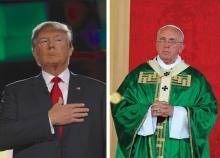
Americans’ most admired man and woman in the world are — once again — President Barack Obama and former Secretary of State Hillary Clinton.
But the shocker in the Gallup Poll’s Most Admired List released Monday may be the No. 2 spot in the survey, where Donald Trump tied Pope Francis in the year the pontiff visited this country for the first time.
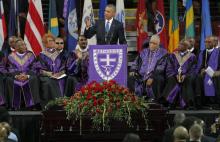
Religion inspired countless other acts of forgiveness, mercy, and hope this year. But religion — or perversions of it, some would say — also inspired horrific violence: the “faith-based” cleansing of ancient lands, and bombings and shootings motivated by scriptural justifications. It was a year also of religious-inspired activism, seen perhaps most prominently in a pope who advocated for the poor and for a solution to climate change. Here is an overview of some of the most consequential religion stories of the past year, with thoughts on what to look forward to 2016.

Cardinal Donald Wuerl is an eminently approachable churchman, and unfailingly polite, yet the archbishop of Washington is hardly the type to wear his emotions on his sleeve.

A year after he delivered a blistering diagnosis of 15 “diseases” plaguing the Roman Curia, including “spiritual Alzheimer’s,” Pope Francis on Dec. 21 listed a 12-point “catalog of needed virtues” that the bishops and cardinals who run the Holy See should seek to follow.
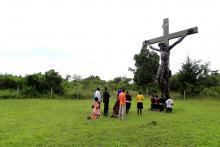
Francis marked the start of the jubilee on Dec. 8, when he opened the Holy Door at St. Peter’s Basilica in Rome. The yearlong celebration calls on Catholics to reflect on the theme of mercy and forgiveness and showcase a more inviting faith. That theme resonates in Africa, home to about 200 million Catholics. A sizable part of this population is tormented by war, violence from Muslim extremists, HIV/AIDS, and poverty.
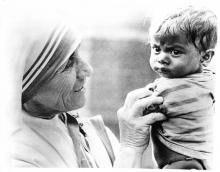
Pope Francis has given final clearance for Mother Teresa — called “the saint of the gutters” for her work with the poor in India — to become an official saint, a move welcomed by the archbishop of Calcutta as “a real Christmas gift” from the pontiff.
Francis took the step by signing a decree declaring that the inexplicable 2008 recovery of a Brazilian man who suddenly woke from a coma caused by a viral brain infection was due to the intercession of the Albanian nun, who died in 1997.

Pope Francis is warning Catholics about con artists demanding money to pass through a holy door, such as the one opened in St. Peter’s Basilica and other churches for the Vatican’s jubilee year, telling them salvation cannot be bought.
“Be careful that there’s not someone a bit quick and too cunning that tells you that you must pay. No! You don’t pay for salvation. You don’t buy salvation. The door is Jesus, and Jesus is free!” the pope told crowds gathered Dec. 16 for his weekly audience in St. Peter’s Square.
Holy doors are being opened in cathedrals around the world as part of the jubilee year, which opened on Dec. 8 and runs until Nov. 20, 2016. The Catholic Church teaches that in making a pilgrimage through one such door, they evoke the passage from sin to grace.
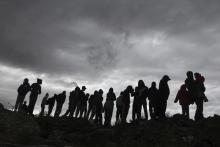
Pope Francis will visit a prison and celebrate Mass in Ciudad Juarez, the Mexican border city plagued by violence in recent years, the Vatican has said in an announcement of details of the pontiff’s upcoming visit to Mexico.
The pope’s visit to Ciudad Juarez will conclude his six-day Mexico tour, starting on Feb. 12. The stop will draw attention to drug-related violence and the U.S. policy on migration.
While in the city on Feb. 17, Francis will tour a prison, meet with workers, and celebrate Mass at the fairgrounds close to the border. Around 220,000 people are expected to attend the Mass, with tickets offered to parishes on both sides of the Mexico-U.S. border.
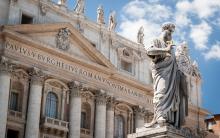
A European financial crimes watchdog on Dec. 15 called on the Vatican to prosecute those caught money laundering, stating the Holy See must act to ensure the success of its financial reforms.
“There is a need now for the anti-money laundering and counter terrorist financing system, to deliver effective results in terms of prosecutions, convictions and confiscation,” said the report by the Council of Europe’s Moneyval oversight agency.
Although the Holy See has adopted new legislation in recent years to tackle money laundering within the city-state, there have been no indictments or prosecutions as a result of the new rules.
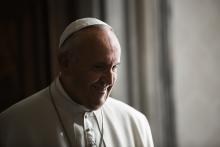
Pope Francis hailed the “historic” climate change agreement signed in Paris, urging the international community to swiftly implement the deal.
Speaking to the faithful in St. Peter’s Square on Dec. 13, Francis called on world leaders to act on the unprecedented environmental agreement signed on Dec. 12 by nearly 200 countries.
“The conference on climate has just finished in Paris with the adoption of an agreement, defined by many as historic. Carrying it out will require a unanimous commitment and generous dedication on everyone’s part,” he said.

The Vatican has said that Catholics should witness to their faith but not undertake organized efforts to convert Jews, a significant step forward in the once tense relations between the two faiths.
The document released on Dec. 10 by the Vatican’s Commission for Religious Relations With the Jews also pushed for greater efforts to fight anti-Semitism.
In its most explicit commentary on evangelization regarding Jews, the document said Catholics should take a different approach to Judaism than to other religions.
This week's Wrap was guest curated by Sojourners contributor Adam Ericksen. Read along for his top stories and notes from the week!
There was a lot of negativity in the news this week, but mercy also filled the airwaves. In case you missed it, here’s a list of some merciful events from the week:
1. Pope Francis Opens the Door to ‘Year of Mercy’ in a Time of Fear
Sure, we have some differences, but we’re still crushing on the Pope. “To pass through the holy door means to rediscover the infinite mercy of the Father who welcomes everyone and goes out personally to encounter each of them.”
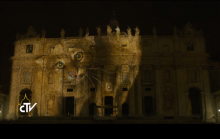
An extraordinary illuminated projection of images of the natural world onto St. Peter’s Basilica on the evening of Dec. 8 drew thousands of awed spectators to the Vatican and delighted untold numbers more watching online and via widespread media coverage of the three-hour show.
But not everyone was happy with the spectacle, not by a long shot, as social media and conservative Catholic sites erupted with indignation.
“This has gone beyond ridiculous,” fumed a conservative blogger, the Rev. John Zuhlsdorf, who called it “irreverent” to use a sacred space for a secular purpose.
“Why not rent out the Sistine chapel too, while they’re at it?”

Pope Francis launched the jubilee of mercy on Dec. 8 with the opening of the Vatican’s holy door, joined by his predecessor Pope Emeritus Benedict XVI, and thousands of pilgrims gathered in St. Peter’s Square, surrounded by heavy security.
“This extraordinary year is itself a gift of grace,” Francis told the faithful gathered at the Vatican.
“To pass through the holy door means to rediscover the infinite mercy of the Father who welcomes everyone and goes out personally to encounter each of them.”
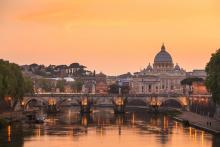
In the Catholic Church, a jubilee — or a holy year — is a religious event that involves the forgiveness of sins, as well as reconciliation. But the idea of a jubilee dates back to the Bible: “And you shall sanctify the fiftieth year, and proclaim freedom throughout the land for all who live on it,” Leviticus 25:10. For the ancient Israelites, the jubilee was a time properties were returned to their original owners or legal heirs, slaves were set free, and creditors were barred from collecting debts.
Pope Boniface VIII in 1300 declared the first Christian jubilee, beginning with the opening of the Holy Door, an entrance to St. Peter’s Basilica, usually blocked, through which pilgrims can enter. Other holy doors are also opened for this jubilee in Rome and around the world for the first time; the year ends when they are closed.
On Nov. 29 Pope Francis opened a door at the cathedral in Bangui, the capital of the Central African Republic, as a symbolic start to the Holy Year.

I wonder if Pope Francis knows that he’s being used to justify bombing Syria.
After an all-day debate on Dec. 2, the House of Commons authorized the British government to begin bombing ISIS in Syria. Hours later, RAF Tornadoes attacked an oil field in eastern Syria.
During the debate, Caroline Spelman, the member of parliament who represents the Church of England in the Commons, noted that, “The Archbishop of Canterbury made it clear that, in his view, force might be necessary to keep the refugees safe.”
Then, citing Pope Francis, she said, “‘Where aggression is unjust, aggression is licit against the aggressor.’ These are views which I share, which is why I will support the motion.”
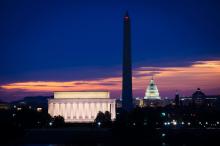
SHORTLY AFTER THE November mid-term elections, Pope Francis officially launched a campaign of his own—although one with a decidedly different tone than that of most politicians. Dec. 8 marked the start of the “year of mercy,” which in Francis’ words is a chance for the church to consider how it “can make more evident its mission of being a witness of mercy.”
This challenge is not one that seems to have taken root in our political conversation, and I’ve seen little evidence of it in the presidential candidate debates. In a year when we will democratically elect a leader of one of the most powerful nations in the world, how will mercy figure into the strategy?
Specially designated “jubilee years” are a Christian tradition that began in the early 14th century, based on the biblical mandate in Leviticus 25 and Jesus’ call for the “year of the Lord’s favor” in Luke 4. In the Catholic tradition, jubilee years serve as calls to grow in one’s relationship with God through prayer, blessings, and penance.
Of course, calling this time a year of mercy doesn’t mean that it’s the only year we are called to focus on mercy; rather it is an effort to get the church and the world to consider the quality of mercy more closely, more deeply, so it permeates our daily lives and influences our actions. (Like a New Year’s resolution that actually sticks!)
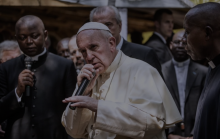
Anyone who’s ever read Pope Francis’ writings knows his flair for lyricism. Take the following passage from his “Laudato Si’”:
“Through our worship of God, we are invited to embrace the world on a different plane. Water, oil, fire, and colors are taken up in all their symbolic power and incorporated in our act of praise.”
This week, the Internet decided to help the Holy Father with his lyrics, just in case he ever decides to drop a rap album (and honestly, who knows with Pope Francis? He’s full of surprises. He did release a prog-rock album recently — truly.)
The inspiration for the Internet’s collective creativity was the below picture, in which Pope Francis looks like he’s about to spit holy fire.
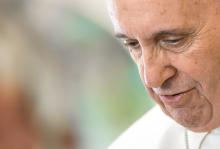
Pope Francis wrapped up his six-day trip to Africa in the war-torn Central Africa Republic on Nov. 30 by warning that religious conflicts are spawning civil war, terrorism, and suffering throughout the continent.
“Together we must say no to hatred, to revenge and to violence, especially violence perpetrated in the name of a religion or of God himself,” the pope said in Bangui, the capital.
“Together, we must say no to hatred, to revenge and to violence, particularly that violence which is perpetrated in the name of a religion or of God himself. God is peace, ‘salaam,’ ” the pope said, using the Arabic word for peace.

Throngs of Roman Catholics are expected to greet Pope Francis when he visits East Africa this week.
But the Rev. Anthony Musaala won’t be a part of the official welcoming delegation.
Two years ago, Ugandan Archbishop Cyprian Lwanga suspended Musaala indefinitely — barring him from administering the sacraments — when Musaala wrote an open letter that challenged his priestly vows of celibacy, condemned sexual abusers among the clergy, and criticized priests who father children and abandon them.
Lwanga said the letter “damages the good morals of the Catholic believers and faults the church’s teaching.”